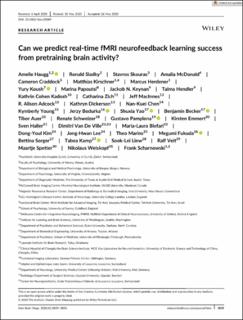| dc.contributor.author | Haugg, Amelie | |
| dc.contributor.author | Sladky, Ronald | |
| dc.contributor.author | Skouras, Stavros | |
| dc.contributor.author | McDonald, Amalia | |
| dc.contributor.author | Craddock, Cameron | |
| dc.contributor.author | Kirschner, Matthias | |
| dc.contributor.author | Herdener, Marcus | |
| dc.contributor.author | Koush, Yury | |
| dc.contributor.author | Papoutsi, Marina | |
| dc.contributor.author | Keynan, Jackob N. | |
| dc.contributor.author | Hendler, Talma | |
| dc.contributor.author | Cohen Kadosh, Kathrin | |
| dc.contributor.author | Zich, Catharina | |
| dc.contributor.author | MacInnes, Jeff | |
| dc.contributor.author | Adcock, R. Alison | |
| dc.contributor.author | Dickerson, Kathryn | |
| dc.contributor.author | Chen, Nan-Kuei | |
| dc.contributor.author | Young, Kymberly | |
| dc.contributor.author | Bodurka, Jerzy | |
| dc.contributor.author | Yao, Shuxia | |
| dc.contributor.author | Becker, Benjamin | |
| dc.contributor.author | Auer, Tibor | |
| dc.contributor.author | Schweizer, Renate | |
| dc.contributor.author | Pamplona, Gustavo | |
| dc.contributor.author | Emmert, Kirsten | |
| dc.contributor.author | Haller, Sven | |
| dc.contributor.author | Van De Ville, Dimitri | |
| dc.contributor.author | Blefari, Maria-Laura | |
| dc.contributor.author | Kim, Dong-Youl | |
| dc.contributor.author | Lee, Jong-Hwan | |
| dc.contributor.author | Marins, Theo | |
| dc.contributor.author | Fukuda, Megumi | |
| dc.contributor.author | Sorger, Bettina | |
| dc.contributor.author | Kamp, Tabea | |
| dc.contributor.author | Liew, Sook-Lei | |
| dc.contributor.author | Veit, Ralf | |
| dc.contributor.author | Spetter, Maartje | |
| dc.contributor.author | Weiskopf, Nikolaus | |
| dc.contributor.author | Scharnowski, Frank | |
| dc.date.accessioned | 2021-08-03T10:24:57Z | |
| dc.date.available | 2021-08-03T10:24:57Z | |
| dc.date.created | 2021-02-21T13:45:28Z | |
| dc.date.issued | 2020 | |
| dc.identifier.issn | 1065-9471 | |
| dc.identifier.uri | https://hdl.handle.net/11250/2765994 | |
| dc.description.abstract | Neurofeedback training has been shown to influence behavior in healthy participants as well as to alleviate clinical symptoms in neurological, psychosomatic, and psychiatric patient populations. However, many real-time fMRI neurofeedback studies report large inter-individual differences in learning success. The factors that cause this vast variability between participants remain unknown and their identification could enhance treatment success. Thus, here we employed a meta-analytic approach including data from 24 different neurofeedback studies with a total of 401 participants, including 140 patients, to determine whether levels of activity in target brain regions during pretraining functional localizer or no-feedback runs (i.e., self-regulation in the absence of neurofeedback) could predict neurofeedback learning success. We observed a slightly positive correlation between pretraining activity levels during a functional localizer run and neurofeedback learning success, but we were not able to identify common brain-based success predictors across our diverse cohort of studies. Therefore, advances need to be made in finding robust models and measures of general neurofeedback learning, and in increasing the current study database to allow for investigating further factors that might influence neurofeedback learning. | en_US |
| dc.language.iso | eng | en_US |
| dc.publisher | Wiley | en_US |
| dc.rights | Navngivelse 4.0 Internasjonal | * |
| dc.rights.uri | http://creativecommons.org/licenses/by/4.0/deed.no | * |
| dc.title | Can we predict real-time fMRI neurofeedback learning success from pretraining brain activity? | en_US |
| dc.type | Journal article | en_US |
| dc.type | Peer reviewed | en_US |
| dc.description.version | publishedVersion | en_US |
| dc.rights.holder | Copyright 2020 The Authors | en_US |
| cristin.ispublished | true | |
| cristin.fulltext | original | |
| cristin.qualitycode | 2 | |
| dc.identifier.doi | 10.1002/hbm.25089 | |
| dc.identifier.cristin | 1892099 | |
| dc.source.journal | Human Brain Mapping | en_US |
| dc.source.pagenumber | 3839-3854 | en_US |
| dc.identifier.citation | Human Brain Mapping. 2020, 41 (14), 3839-3854. | en_US |
| dc.source.volume | 41 | en_US |
| dc.source.issue | 14 | en_US |

